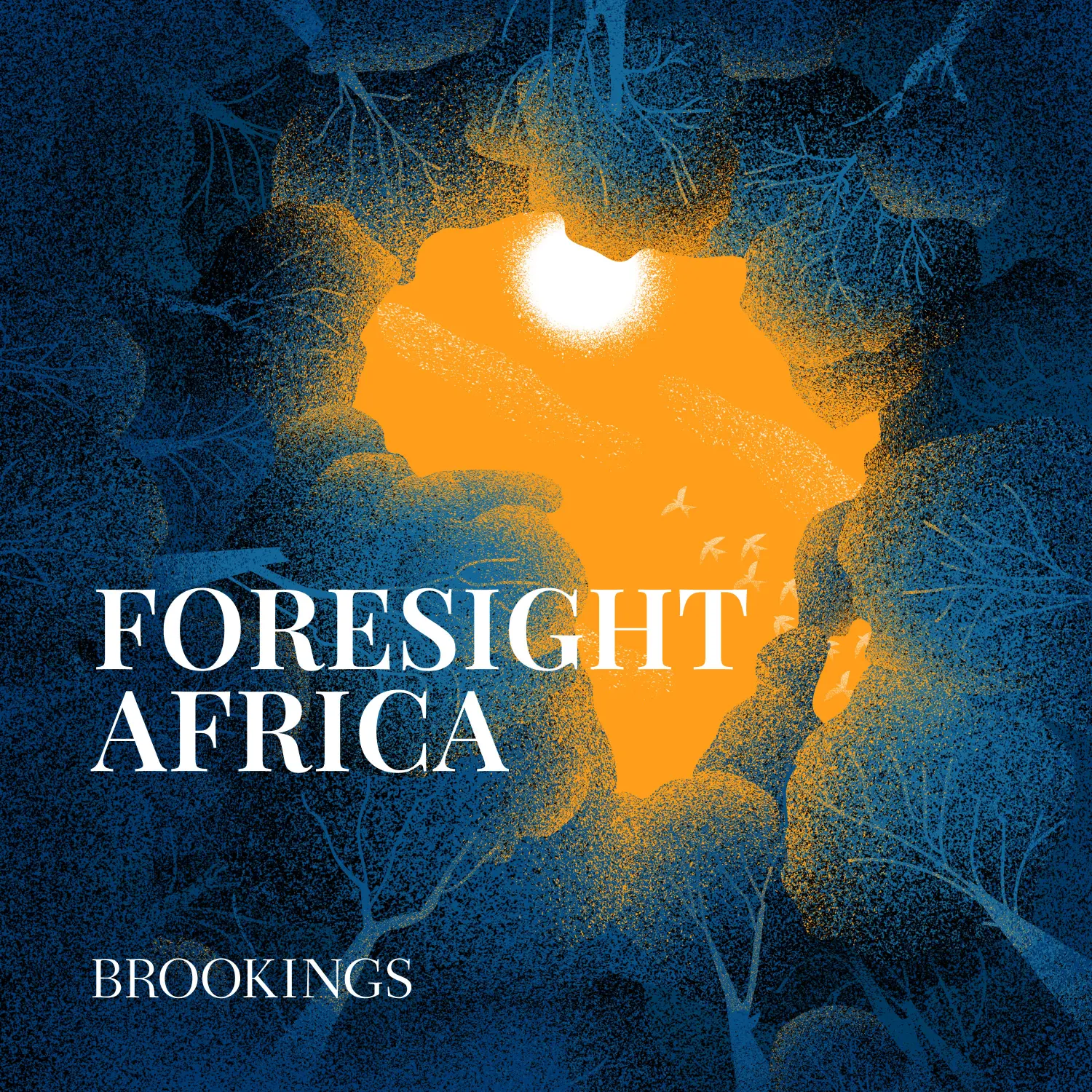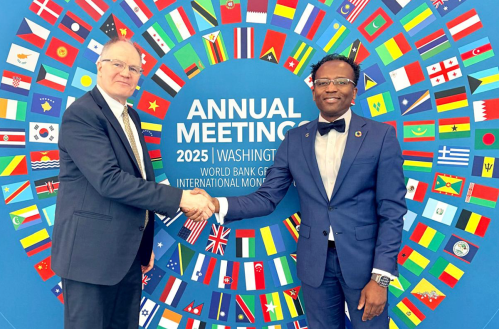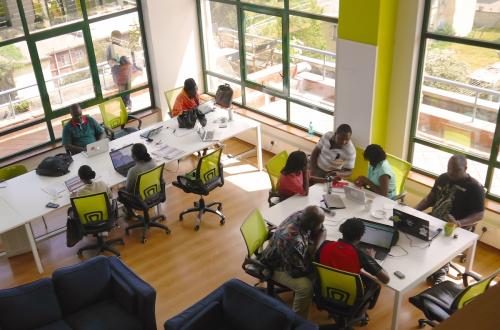This audio recording is part of the World Bank/IMF Spring Meetings 2025 special episode of the Foresight Africa podcast. Listen to the full episode, which includes interviews with six other speakers on site at the event.
Landry Signé, senior fellow in the Global Economy and Development program and the Africa Growth Initiative at the Brookings Institution and host of the Foresight Africa Podcast, engages with distinguished leaders in policy, business, academia, and civil society who share their unique insights and innovative solutions to Africa’s most complex challenges while highlighting the continent’s opportunities to advance impactful engagement between Africa, the U.S., and the global community. During the IMF/World Bank Spring Meetings in Washington, D.C., Signé spoke with high-level officials about their takeaways from the meetings and the impact and potential that international cooperation can have on the global economy.
In this interview, he speaks with Ilyas Moussa Dawaleh, minister of finance, economy, and industry for the Republic of Djibouti, a role he has held since 2011. Prior to joining the government, he was chief operating officer at the Port of Djibouti and has also worked in the private sector, serving as CEO of multiple companies.
Transcript
DAWALEH: So thank you for having me. My name is Ilyas Moussa Dawaleh, I’m minister of finance and economy in charge of industry from Djibouti, the Republic of Djibouti. Djibouti is, I think, known to some extent being at the crossroad of three continents when you come to Asia, Africa, and Europe on the Red Sea. And right at the Bab el-Mandab Strait. So happy to be here with you and having a couple of questions from Brookings.
SIGNÉ: Fantastic, thank you so much for joining us today, Excellency. So to begin with, the first question. What are your key takeaways from the 2025 Spring Meetings?
DAWALEH: All right, what what would be my takeaway? And really, it’s timely subject and chosen for this Spring Meeting, which is jobs. And of course, in Africa, job creation is the most pressing issue for our government, from Djibouti, all over Africa. As we all know, we are gifted with a demographic dividend. But at the same time, that demographic dividend might also be a demographic which could raise numbers of problems. So we are all striving to make sure that we are really delivering jobs and decent jobs for our youth and also for women, because 50% of the population will not be left behind.
So it may be an opportunity to really extend my deep respect and appreciation to the leadership of the World Bank Group and very specifically to Mr. Ajay Banga, who is really that much close to our concerns when it comes to Africa agenda. He has a deep knowledge and sensitive on our challenges, which we feel really at last someone at the leadership has a deep understanding of what we, Africa, requires and what should we do together with. Djibouti has a strong partnership with the World Bank. IDA [International Development Association] represents everything for countries like Djibouti because of our our dynamic region in a very sensitive and mostly known as a region where conflicts are. So we very much value this Spring Meeting of 2025.
SIGNÉ: Fantastic! How might the 2025 Spring Meetings shape policy decisions and deliver tangible results across Africa moving forward?
DAWALEH: Africa is blessed with resources; Africa is blessed with its demographic dividend. Africa still remains lacking behind in terms of infrastructure. So the way it’s framed, that in a great objective of creating decent jobs in our countries and developing countries we require a couple of elements and fundamentals to be fixed. And all of us are striving really to match those requirements. It’s not because partners are looking from us to make those changes, but it’s imperative for countries like Djibouti, and the Horn of Africa, and the continent in large.
And, for instance, when it comes to our Horn of Africa region, we are trading much up to 6% only among the region. We look at challenges, but those challenges represent also great steppingstone, and for betterment in terms of wealth creations, job creations. The principles of creating jobs means developing also. They’re both coming intertwined. Striving for development means creating also jobs. Once jobs are created, it means development is happening.
What are the principal fundamentals for those for that agenda, key agenda? It’s about infrastructures. It’s about skills. It’s empowering youth and women in terms of creating opportunities. It’s about energy first and foremost because unless we really put the energy reform sector in reforms, unless we deliver in energy production—be it at regional level because it’s very important we’re trading energy in our Horn of Africa region, thanks for the potentialities of Ethiopia. So, energy will enrich other sectors in digitalization, when it comes to manufacturing, and infrastructure as a whole will enable our countries in order to really take advantage of our potentialities.
Now, I would like to maybe emphasize a little bit about the regional dimension of where Africa and my country, for instance, and within the region could do better by interconnecting our region, by developing regional connectivity, by developing those infrastructures. By bringing our comparative advantage in other cross-border areas, I think we can really fast-track the development of of of the continent.
More importantly, Africa trade and AFTC is a must when African Union, African countries must deliver in the Continental Free Trade Agreement. And we see how much uncertainties are surrounding us as of today. There is no other way for African countries to come together, to look at indigenous and homegrown and regional and continental grown initiatives in order to. For that, if capacity is missing—and this is the case for my country as well as numbers of countries—this is where we are looking Africa and World Bank Group and MDBs [multilateral development banks] really to come together as one in order to uplift our continent, and reach our the potentialities. And finally, to bring that missing capacity to fast-track the overall the overall transformation we’re really expecting for Africa.
SIGNÉ: Amazing! Thank you so much, Excellency. That is brilliant. Merci beaucoup, Excellence.
-
Acknowledgements and disclosures
The Foresight Africa podcast is brought to you by the Brookings Podcast Network. Send your feedback and questions to podcasts at Brookings dot edu. My special thanks to the production team including Fred Dews, producer; Nichole Grossman, Dafe Oputu, and Nicole Ntungire, associate producers; Gastón Reboredo, audio engineer; and Izzy Taylor, senior communications coordinator in Brookings Global. The show’s art was designed by Shavanthi Mendis. Additional promotional support for this podcast comes from my colleagues in Brookings Global and the Office of Communications at Brookings.
The Brookings Institution is committed to quality, independence, and impact.
We are supported by a diverse array of funders. In line with our values and policies, each Brookings publication represents the sole views of its author(s).





Commentary
Ilyas Moussa Dawaleh on building jobs and infrastructure in Africa
Foresight Africa podcast at the 2025 World Bank/IMF Spring Meetings
May 5, 2025